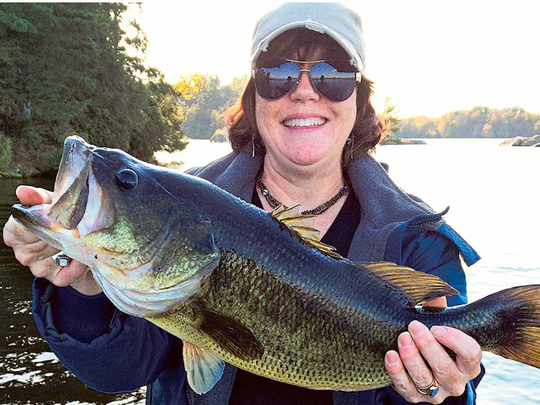
Sitting in a Washington coffee shop, Dana Deighton looks fit, a stylish gold pin affixed to her black wool cape. After shipping her three children off to school, she had taken a brisk 5-kilometre walk before heading downtown to her job as a marketing director at National Geographic Expeditions. Observing her, it is hard to reconcile her apparently robust health with the heart-stopping advice a doctor gave her last year: Get your affairs in order, your life expectancy is measured in months.
In July 2012, Deighton, now 44, developed rashes followed by severe joint and stomach pain. Later that year, she was told she had lupus, an autoimmune disorder that can damage organs.
The correct diagnosis, made in April 2013, was infinitely grimmer. Deighton vividly remembers sitting with her husband in the Northern Virginia office of a specialist as he lay out her future. “This really sucks,” Deighton remembers him saying. Treatment would be arduous. If she was lucky, she might live another 16 months.
Deighton singles out that meeting, among scores of encounters with more than a dozen doctors at hospitals in the Washington area, Baltimore and New York, as the worst moment of the past two and a half years. She said she remembers thinking, “If I can get out of here in the next two minutes, I’m going to be making a lot of phone calls.”
Her approach to her health has been driven by a simple set of rules: Do lots of research, ask tons of questions and don’t settle for something that doesn’t feel right.
“I’m a problem-solver, and I just felt I was different,” Deighton said. “This was just too weird and random.”
To Mohan Suntharalingam, the Baltimore specialist who has gotten to know Deighton well during the 18 months he has overseen her care, her response to treatment is as uncommon as her strong will, her clear-eyed understanding of her disease and her ability to advocate for herself.
“I think we all recognise that there’s something unusual about Dana’s case” that defies explanation, said Suntharalingam, who is also known as Suntha. “Is there something different about her biology? We don’t know.”
Deighton has always been extremely healthy, careful about her diet and an athlete who loved playing sports and ran 45 kilometres each week. In July 2012, when she developed a silver-dollar-sized rash on her arm, Deighton assumed it was a bug bite and brushed it off. During a trip to Glacier National Park in Montana, she noticed that her joints hurt and thought she might have overdone the hiking.
A month later, she woke up with excruciating pain and swollen joints in her elbows, wrists and fingers. A crimson rash covered the back of her neck, then spread to her face. Her internist, who ordered blood tests, ruled out Lyme disease and told Deighton she suspected lupus. Deighton promptly made appointments with rheumatologists at three area hospitals. “I wanted the best, and I wanted to get this figured out right away,” she said.
Tests confirmed the lupus diagnosis, and Deighton began taking medication. She was depressed by her inability to move easily — or sometimes at all — a hallmark of lupus, which causes achy, swollen joints. She tried to ignore her worsening fatigue, which she chalked up to her job, her children and caring for her grandfather, who was in his late nineties.
In February 2013, Deighton awoke one morning with a terrible stomach ache. Initially she assumed it was the aftereffects of the previous night’s restaurant dinner. But a week later, the wringing pain had spread to her back. She made an appointment with the gastroenterologist who had performed her colonoscopies.
A decade earlier, Deighton’s mother, a 61-year-old nurse, had died of colon cancer just six weeks after she was diagnosed. Deighton described her mother as a timid person who never questioned her doctors or sought a second opinion and who had suffered a horrible death from sepsis after botched cancer surgery.
“I never wanted to fall into that trap,” Deighton said. She arrived at doctors’ appointments armed with a list of questions, and took careful notes.
The gastroenterologist suspected the pain might be irritable bowel syndrome, a catchall diagnosis for stomach pain and other digestive problems. Deighton, who had her doubts, tried to tamp down the feeling that something more serious was wrong.
Several days later, she said, she was “feeling very ill and having trouble getting through the day” when she put her hands on her neck and froze. On her right side was a painless, immobile lump the size of a Brussels sprout. “I knew it was bad,” she recalled.
A CT scan indicated probable cancer. Deighton then underwent a fine-needle biopsy, which extracts tissue samples for analysis. The results stumped the pathologist: The cancer was aggressive, but its primary location elusive. A full body scan revealed a large ovarian cyst and abnormal abdominal lymph nodes.
A gynaecologic oncologist scheduled Deighton for chemotherapy to treat ovarian cancer, although other doctors weren’t sure what kind of cancer she had. “He said he was sure it was ovarian cancer” and urged her not to delay starting treatment, Deighton said. She didn’t trust him, took her records and left.
She consulted a second gynaecological oncologist, who ordered additional tests, which ruled out ovarian cancer; the cyst would later disappear. Deighton consulted several cancer specialists who thought she might have two forms of cancer, including lymphoma, which can present as a swollen neck lymph node. Doctors removed the lump on Deighton’s neck; tests indicated a gastrointestinal origin.
In April, pathologists at Johns Hopkins, where her tissue samples had been sent by her oncologist for a second opinion, settled on a shocking diagnosis: an aggressive oesophageal cancer, classified as Stage 4, the most advanced and lethal form of any malignancy. The grape-sized tumour on her oesophagus had spread to her neck and there were numerous cancerous lymph nodes in her abdomen. No one was sure what had caused the joint pain or rash, which had largely disappeared.
A few days later, Deighton and her husband were given the dismal prognosis by the Northern Virginia oncologist she was then seeing. She and her husband could not speak as the doctor told Deighton, not unkindly, to enjoy the time she had left with her children, the oldest of whom was 12.
As devastating as the diagnosis was, Deighton said, “a tiny voice said, ‘You cannot be right.’” Nothing fit: Oesophageal adenocarcinoma, a rare cancer, typically affects men older than 60, many of them overweight smokers or heavy drinkers, or those with a history of acid reflux disease. Even their symptoms were different: They typically had trouble swallowing and lost considerable amounts of weight.
“I knew I was different and I had a chance,” she said, “but I was having trouble” getting doctors to buy into that vision. The oncologists she consulted recommended immediate chemotherapy; the average life expectancy for people with Deighton’s cancer is about six to 12 months. Another option is palliative care, which aims not to cure disease but to relieve pain and suffering.
In May, Deighton sought out oesophageal cancer experts in Baltimore, including Suntha,a professor of radiation oncology at the University of Maryland Medical Centre and associate director of the Greenebaum Cancer Centre there, whom a close friend had recommended. He advised that she start chemo and told her he would be available for further consultation should the need arise.
Deighton began treatment at another Baltimore hospital, undergoing eight cycles of chemotherapy — two more than recommended because she tolerated it so well. Although her hair fell out and she was tired, Deighton had no nausea. Her response was deemed excellent: The metastases shrank significantly and no new tumours appeared. Deighton broached the idea of radiation as a possible way to eliminate her cancer.
“Dana, my radiation oncologist isn’t even going to talk to you,” she said her oncologist told her. Her disease was simply too advanced. Her best bet, he advised, was a new chemo regimen.
Unconvinced, Deighton travelled to New York in September 2013 to consult a prominent specialist in oesophageal cancer. Echoing the other oncologist, he told her radiation was out of the question.
She returned to Suntha, with whom she had kept in touch. Unlike other doctors, he and his colleagues seemed willing to consider other options. “They saw I had a lot more energy and a lot of life. Suntha said, ‘We just can’t treat you like a typical patient,’” Deighton recalled. “He said I was not fitting into any of the data buckets. And he was willing to think outside the box.”
Based on her response to chemotherapy and her overall good condition, Suntha believed it was worth trying radiation in an effort to eradicate the tumour and wipe out any lingering metastases. The treatments, begun in December 2013, shrank the tumour and eliminated the metastases.
By February 2014, 10 months after she was diagnosed, Deighton was preparing to run a 15-kilometre race. “I felt great, like my old self,” she said. She wanted to try surgery, a major operation called a transthoracic oesophagectomy, usually reserved for patients with early-stage cancer. The procedure is one of the most complicated and difficult operations in medicine. It involves removing most of the oesophagus (and with it the tumour) and pulling up part of the stomach to fashion a new oesophagus. Serious digestive and other complications are common, and the procedure has an overall mortality rate of about 9 per cent.
Because Deighton had done unusually well, “the conversation then became: ‘Should you even think about doing surgery?’” Suntha recalled. “This is on the far end of the spectrum of the approach we’d consider. But here is this patient who, instead of having disease progression, had only one area of active disease. She was otherwise healthy and physically and emotionally strong.” Deighton, who knew the risks, pushed for surgery. Suntha and the thoracic surgeon on her medical team thought it was worth a shot.
But her medical oncologist was strongly opposed. She told Deighton she feared the operation would mar her quality of life — or worse. After much soul-searching, Deighton decided surgery was the only hope for eliminating her cancer. “I want to keep living for my children,” she said. The doctors knew “that if they didn’t get that tumour out, there was no other option.”
On June 9, Deighton underwent a 15-hour operation, which was deemed a success. She went back to work in July and began another round of standard chemotherapy, which she described as punishing, to kill any lingering cancer cells. For the next year she will receive Herceptin, an immunotherapy drug. Immunotherapy, an active area of cancer research and treatment, harnesses a patient’s immune system to attack malignant cells.
The first measure of her progress came recently, when Deighton underwent a series of scans. The results could not have been better. They showed no sign of cancer anywhere in her body.
“I’m feeling great,” she said. Surgery made her feel “stronger and healthier. It gave me a new lease on life.” Even if the next scan shows that the cancer has returned, Deighton said, the operation “absolutely” was worth it.
In addition to luck and several excellent doctors, especially Suntha and the other members of the Maryland team, Deighton said she believes her willingness to ask questions and to advocate for herself has played a major role in how well she has done.
“I asked the gross stuff, the silly stuff, and a lot of people laughed at me,” she said. “I guess I’m stubborn — and fortunate.”
To Suntha, Deighton’s case remains a mystery — not the first he has encountered. “We have had other patients with something unique about their biology who have quote, ‘beaten the odds’ ... but they are the exception rather than the rule.”
Only a few have gone three years without a recurrence, Suntha said. He and Deighton hope she will, too.
Washington Post












